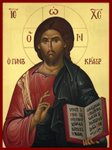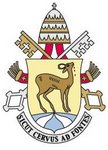
As a quick reminder, all references, unless otherwise stated, are from Jesus of Nazareth...
In the previous installment, we studied Jesus' baptism in order to understand the Mountain of Temptation better. (The previous blogs are here and here.)
Following the baptism, the Gospel of Mark tells us that "the Spirit immediately drove him into the wilderness" (Mk 1:12) to be tempted. All of Jesus' temptations strike at the heart of his mission and what is truly important in human life. Ratzinger:
At the heart of all temptations...is the act of pushing God aside because we perceive him as secondary, if not actually superfluous and annoying, in comparison with all the apparently far more urgent matters that fill our lives. p. 28
He continues:
Moral posturing is part and parcel of temptation. It does not directly invite us to do evil...it pretends to show us a better way, where we finally abandon our illusions and throw ourselves into the work of actually making the world a better place...It claims, moreover to speak for true realism: What's real is what is right there in front of us - power and bread...God is the issue: Is he real, reality itself or isn't he? Is he good, or do we have to invent the good ourselves?...What must the Savior of the world do or not do? p. 28-29
All the temptations of Jesus come down to this: the bread, the pinnacle of the temple, and the high mountain are are temptations to use wealth and power to bring about a "kingdom" that makes sense to us but denies the primacy of God.
The devil approaches Jesus on this mountain to cause him to compromise his mission (and his very self) as the Messiah and the Suffering Servant by choosing the way of a political messiah by ruling through power and wealth. Ratzinger relates that this choice, between a worldly messiah (who rules through power and bread) and the true, "other-worldly" Messiah (who rules through the self-emptying and suffering of the Cross), was offered to the crowd in front of Pilate. Jesus, the Son of the Father, on one side with Barabbas, which means the "son of the father", on the other (cf. p.41). The one Messiah that rules through taking upon himself the sins of the world in humble surrender and sacrifice and the other a pseudo-messianic insurrectionist that rules through the sword and hatred.
Who will we choose? What kind of Savior did we expect? Couldn't have Jesus fed the world? Isn't that the most important thing? Isn't "justice" the one and only thing that Jesus came to bring? We all know who we chose. We crucified the Holy One of Israel and celebrated the one who brings us power and bread.
The tempter is not so crude as to suggest to us directly that we should worship the devil. He merely suggests that we opt for the reasonable decision, that we choose to give priority to a planned and thoroughly organized world, where God may have his place as a private concern but must not interfere in our essential purposes. (emphasis mine) p. 41
Thus, the Mountain of Temptation is where we too must decide whom we will choose. How often do we pick the stable, sensible way! How often do we choose to "rule" by power rather than by love! How often do we push aside God for what is easy and expedient! We speak of "justice" all the while rejecting the One who is Just. Case in point: the concern of the first world Church for feeding the poor, healing the sick, and solidarity. These are fine things in themselves, but when is the last time that Evangelization was seriously spoken of in the context of justice? Jesus, Himself, did not heal everyone in any particular town but moved on to preach the coming kingdom! The sick of Capernaum were searching for him. Jesus responded to Peter's plea:
"Every one is searching for you." And he [Jesus] said to them, "Let us go on to the next towns, that I may preach there also; for that is why I came out." Mk 1:37-38
Our position must be one of docility and obedience just as was Jesus'. We must do what he asks of us, which may go against everything we hold by worldly "common sense".
The Mountain of Temptation asks each of us the question, "Do you trust God?" Do we trust God to provide our daily bread and the bread of the world. Do we trust God to protect us? Do we require from God a proof of his Divinity? Who will we choose: God or ourselves? Our ways or his ways?
The way off this mountain is to trust God completely; that what he says is true because he says it. It is the path of loving, self-sacrifice. It is the path that seeks to give oneself to God first and foremost before undertaking the work that God calls us to. It is the narrow path leading to life through self-emptying, forgiveness of those that hurt us, and love for our enemies. It is the path of union with God and communion with our neighbor.



No comments:
Post a Comment